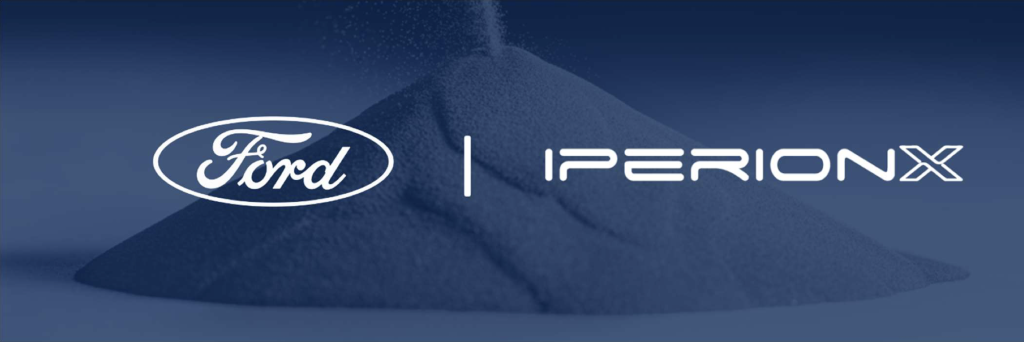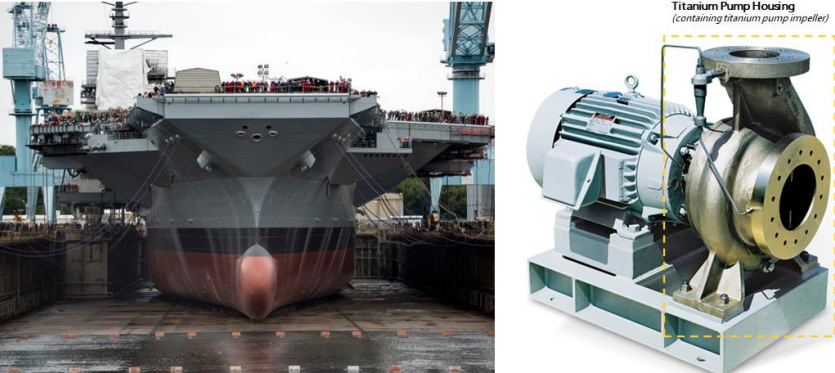North Carolina-based titanium developer IperionX will supply Ford, a multinational automotive manufacturer, with 100% recycled, low-carbon titanium. This announcement comes as Ford looks to reduce its carbon footprint, having committed to achieve carbon neutrality by 2050.
The Scope of Work (SoW) agreement forms part of an ongoing collaboration between the two companies to design, test, and 3D print titanium components for future Ford Performance production vehicles.
Parts additively manufactured using titanium possess high corrosion resistance, durability, and a superior strength-to-weight ratio compared to those produced with alternative materials. This makes them ideal for use in the automotive industry.
Additionally, IperionX’s titanium can be fully recycled at the end of the product’s life. This improves the sustainability of the components and is essential for establishing a fully circular, low-carbon automotive supply chain. IperionX claims that this is not possible with other commercially available titanium production processes.
“We are proud to partner with Ford to accelerate the deployment of a sustainable, circular titanium supply chain for the global automotive market,” commented IperionX CEO Taso Arima. “Our low-carbon titanium metal is uniquely made with 100% recycled titanium and can significantly improve automotive supply chains by using high-strength titanium components with nearly half the weight of steel.”

IperionX and Ford’s agreement
This agreement sets out a comprehensive quality and strength testing program for IperionX’s titanium material. Ford’s Sustainability and Advanced Materials divisions have already conducted a number of testing procedures. These tests verified that IperionX’s titanium has surpassed the parameters set under ASTM International standards.
A comprehensive “finishing study” will also be conducted as part of the SoW. This will assess a range of surface finishing options for the titanium components. These insights will ultimately be used to determine the final design and unit costs for titanium components used for Ford Performance production vehicles.
This collaboration fits into a wider Ford initiative to secure their supply-chains, improve sustainability, and reduce its carbon footprint. For instance, Ford has recently joined the First Movers Coalition. This initiative incorporates a global coalition of over 50 companies who are using their purchasing power to establish early markets for clean technologies.
In addition to Ford, this coalition includes multinational companies such as Volvo, Airbus, Apple, Amazon, and Microsoft. The initiative aims to scale-up emerging technologies that are essential for a net-zero transition by 2050.
IperionX’s sustainable titanium offering
A recent Life Cycle Assessment (LCA) conducted by EarthShift Global, an independent LCA consultancy, has assessed IperionX’s titanium offering.
According to the LCA, titanium powder produced at IperionX’s Virginia based Titanium Demonstration Facility (TDF) has the potential for a life cycle carbon footprint of 7.8kg of carbon dioxide equivalents per kg. According to IperionX, this represents the lowest quantified life cycle carbon footprint for commercial titanium powder. In fact, this carbon footprint is over 90% lower than that of competing titanium powders produced from plasma atomization.
IperionX has a strong history of collaborating with organizations to improve their sustainability and supply-chain security. For instance, earlier this year, it was announced that IperionX had collaborated with pump manufacturer Carver Pump to 3D print titanium pump parts for the US Navy.
By utilizing IperionX’s recycled US-based titanium powders, the US Navy will supposedly be able to cut lead times for critical components, boost equipment availability, and sustainably re-shore a US titanium metal supply chain.

Sustainability and reshoring supply chains in the 3D printing industry
Increasing sustainability, reducing carbon emissions, and reshoring supply chains are key areas of interest within additive manufacturing at the minute.
Earlier this year, during RAPID + TCT 2023, 6K additive, a producer of industrial 3D printing materials, announced a partnership with Australian based company Surgical Metal Recycling (SMR) to recycle end of life surgical implants.
6K Additives’s UniMelt production-scale microwave plasma platform will be leveraged to convert these implants into new titanium powder, which can then be used to make new implants. During RAPID + TCT, Leslie Frost, Senior Director of Marketing at 6K Additive, told 3D Printing Industry that this process will allow for an “incredibly sustainable and circular supply chain.”
Earlier this year, KIMYA, the Additive Manufacturing materials subsidiary of French printing and coating firm ARMOR, published a LCA for their PETG filaments. The assessment found that these recycled filaments help reduce CO2 emissions by up to 35%, when compared to their non-recycled counterparts. According to Benoît Stoeux, Managing Director at KIMYA, this LCA was conducted to “provide users with transparent information on the environmental impact of the materials they use, in order to encourage them to choose more environmentally friendly alternatives.”
Subscribe to the 3D Printing Industry newsletter to ensure you keep up with the latest 3D printing news. You can also follow us on Twitter, like our Facebook page, and subscribe to the 3D Printing Industry Youtube channel to access more exclusive content.
Are you interested in working in the additive manufacturing industry? Visit 3D Printing Jobs to view a selection of available roles and kickstart your career.
Featured image shows engineers at one of IperionX’s pilot facilities. Photo via IperionX.


